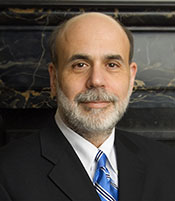 The Federal Open Market Committee meets today and will keep the Fed Funds Rate unchanged at 5.250%. It is not what the Fed does, however, that should concern Americans. It’s what the Fed says.
The Federal Open Market Committee meets today and will keep the Fed Funds Rate unchanged at 5.250%. It is not what the Fed does, however, that should concern Americans. It’s what the Fed says.
First, a clarification. The Fed Funds Rate is directly tied to Prime rate which impacts lines of credit for businesses and homeowners. Ben Bernanke & Co. do not control mortgage interest rates which are determined by the mortgage-backed securities markets. This is another conversation for another time.
When the Fed adjourns this afternoon, it will issue a press release in which it will discuss the economy and inflation. The statement — not the interest rate — is the news worth watching because inflation can unravel markets and push mortgage rates back to their highest levels of the year.
The chain of events is pretty logical:
- If inflation is growing at a faster clip than the Fed wants, it will tell the markets
- If it tells the markets, markets will know that the United States Federal Reserve expects the dollar to lose value over time
- If the U.S. dollar is expected to lose value over time, the U.S. dollar will be “worth less” to foreign nations
- If the U.S. dollar is “worth less” to foreign nations, foreign nations will buy fewer U.S.-denominated securities because the relative returns will be less, too
- If foreign nations buy fewer U.S.-denominated securities because the relative returns is less, the demand for mortgage-backed bonds will drop
- If the demand for mortgage-backed bonds drop, the price of mortgage-backed bonds will drop
- If the price of mortgage-backed bonds drops, the yield of mortgage-backed bonds will increase
- If the yield of mortgage-backed bonds increases, then mortgage rates go up for Americans
It’s a long road to get to the conclusion, but this is the manner in which the Fed impacts real estate and mortgage lending. So when your local daily shows the headline “Fed Leaves Rates Unchanged”, don’t think the coast is clear. Read the article and dig a little deeper — it’s not what they did, it’s what they said.
Kaiser Sose says:
The only new bit of info from this Fed meeting was the comment that housing is experiencing a SIGNIFICANT slowdown, as opposed to only a slowdown like they stated in the last meeting.
Of course, according to you guys on this blog, everything is A-okay with housing and it is always a great time to buy or sell a home.
December 12, 2006 — 12:50 pm
Mariana Wagner says:
WoW! This is a great breakdown of the chain of events from the Fed to the mortgage consumer. (…and I will start looking for the “statement” instead of just the rate…)Thanks!
December 12, 2006 — 2:34 pm
Kaiser Sose says:
Two things you should include Dan.
1) China wants our currency to be strong compared to theirs, so they will buy our bonds no matter what the rate. That’s why the yield curve is inverted. Without China, the 10-year would be 1.5 to 2% higher. If China decides to dump the dollar and invest in Euros or Yen, rates will spike higher, including mortgages. Why do you think Paulson and Bernanke are in China kissing Chinese booty this week?
2) Credit spreads over treasuries. The mortgage backed market is getting hurt, thanks to the unravelling in the sub-prime market. If this spreads to the prime market (and it likely will to some extent), lenders will demand a higher premium (rate) over treasury yields. So, even if treasuries hold steady, you can expect either 1) tightened lending standards which leads to fewer eligible home buyers or, 2) higher mortgage rates to compensate lenders for the increase in risk.
December 12, 2006 — 5:23 pm